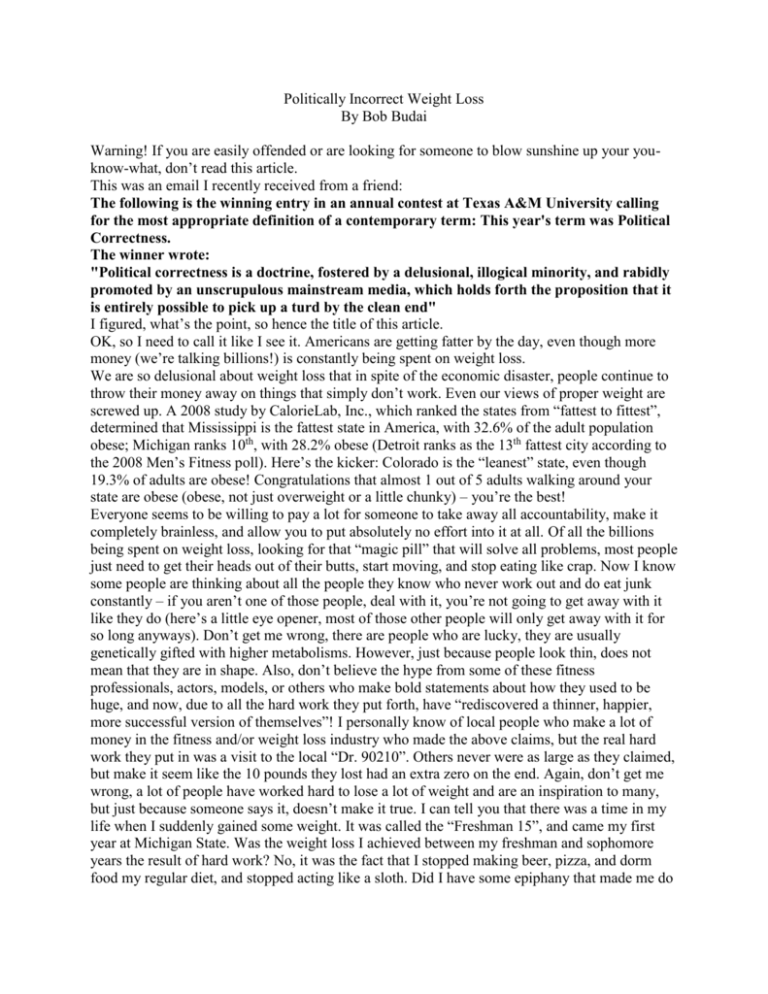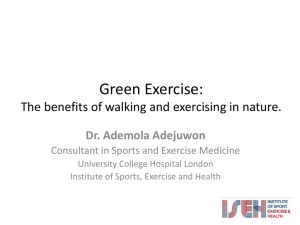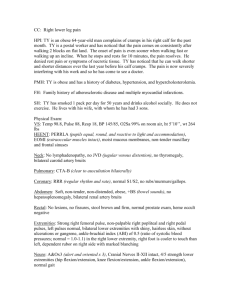H and L Nov 08 Politically Incorrect Weight Loss
advertisement

Politically Incorrect Weight Loss By Bob Budai Warning! If you are easily offended or are looking for someone to blow sunshine up your youknow-what, don’t read this article. This was an email I recently received from a friend: The following is the winning entry in an annual contest at Texas A&M University calling for the most appropriate definition of a contemporary term: This year's term was Political Correctness. The winner wrote: "Political correctness is a doctrine, fostered by a delusional, illogical minority, and rabidly promoted by an unscrupulous mainstream media, which holds forth the proposition that it is entirely possible to pick up a turd by the clean end" I figured, what’s the point, so hence the title of this article. OK, so I need to call it like I see it. Americans are getting fatter by the day, even though more money (we’re talking billions!) is constantly being spent on weight loss. We are so delusional about weight loss that in spite of the economic disaster, people continue to throw their money away on things that simply don’t work. Even our views of proper weight are screwed up. A 2008 study by CalorieLab, Inc., which ranked the states from “fattest to fittest”, determined that Mississippi is the fattest state in America, with 32.6% of the adult population obese; Michigan ranks 10th, with 28.2% obese (Detroit ranks as the 13th fattest city according to the 2008 Men’s Fitness poll). Here’s the kicker: Colorado is the “leanest” state, even though 19.3% of adults are obese! Congratulations that almost 1 out of 5 adults walking around your state are obese (obese, not just overweight or a little chunky) – you’re the best! Everyone seems to be willing to pay a lot for someone to take away all accountability, make it completely brainless, and allow you to put absolutely no effort into it at all. Of all the billions being spent on weight loss, looking for that “magic pill” that will solve all problems, most people just need to get their heads out of their butts, start moving, and stop eating like crap. Now I know some people are thinking about all the people they know who never work out and do eat junk constantly – if you aren’t one of those people, deal with it, you’re not going to get away with it like they do (here’s a little eye opener, most of those other people will only get away with it for so long anyways). Don’t get me wrong, there are people who are lucky, they are usually genetically gifted with higher metabolisms. However, just because people look thin, does not mean that they are in shape. Also, don’t believe the hype from some of these fitness professionals, actors, models, or others who make bold statements about how they used to be huge, and now, due to all the hard work they put forth, have “rediscovered a thinner, happier, more successful version of themselves”! I personally know of local people who make a lot of money in the fitness and/or weight loss industry who made the above claims, but the real hard work they put in was a visit to the local “Dr. 90210”. Others never were as large as they claimed, but make it seem like the 10 pounds they lost had an extra zero on the end. Again, don’t get me wrong, a lot of people have worked hard to lose a lot of weight and are an inspiration to many, but just because someone says it, doesn’t make it true. I can tell you that there was a time in my life when I suddenly gained some weight. It was called the “Freshman 15”, and came my first year at Michigan State. Was the weight loss I achieved between my freshman and sophomore years the result of hard work? No, it was the fact that I stopped making beer, pizza, and dorm food my regular diet, and stopped acting like a sloth. Did I have some epiphany that made me do it? No again, my mother walked in and told me to get off the girl I was dating because I was going to crush her! So let’s cover the 2 big areas regarding weight loss: nutrition and exercise. Realize these are vast subjects and I will not cover everything, but it should give everyone some ideas. Nutrition You don’t need a Master’s degree in Nutrition to know that 6 packs of beer, pizza, burgers, and Kentucky Fried Chicken should not be a staple of your diet. Supplementing 3 “gorge yourself” meals with a constant supply of cookies, potato chips, and other junk that gets shoveled mindlessly into your mouth by the handful throughout the day is also generally bad. Let’s go over some things to know: 1. Different people will respond differently to different diets. Just because 1 diet works well for someone does not mean it will work well for you. Many of the well known diet plans do work for many people if done correctly. A lot of people claim to follow diets correctly, but like to make their own modifications – generally the diets were created by people with more nutrition knowledge and experience than the people following the plans, so stop trying to act like you know better. And if one diet doesn’t work for you (after you’ve given it a legitimate chance), try another one. 2. “Fake food” is bad. This includes anything processed, “preserved”, chemically laden, artificially colored/flavored/sweetened/etc, or anything else you haven’t heard of or don’t know what it is. 3. Small (meaning don’t stuff yourself), regularly spaced (5-6 per day) meals (not snacking all day long) per day increases metabolism. Metabolism is how many calories your body burns during rest and activity. 4. You need a relative balance of protein, carbohydrates, and fat to live and to maintain proper body weight/composition. Everyone’s needs are slightly different, but most have too much sugar/carbohydrates, as well as the wrong kind of protein and/or fat (see #2 above). The other thing that is skewed, is what people consider to be a balance. Having a bowl of cereal and considering the milk to be your protein is not balanced – it’s excess carbs. Half of a chicken breast mixed in with a bowl of pasta and a salad is also not balanced. Next time you’re at the grocery store, check out the nutrition labels on various foods and see how many grams of protein vs. carbohydrates are in things – it’s a lot easier to get the carbs in than the protein. Exercise Just like diet, everyone responds differently to different exercise regimes. Effective exercise ranges from just getting out of bed for some people, to needing extremely intense regular bouts. As with people’s false claims about their own weight loss, don’t always believe what you hear about exercise either. I had an experience with a well known person in the weight loss industry who adamantly told me that “walking is the only exercise people need, and that everyone will lose weight by walking”. She then proceeded to tell me about all the weight she lost just by walking. I found it interesting that later in the conversation she told me about all the machines and circuits her personal trainer had her doing, and I wanted to ask her what happened to just walking? Let’s address some exercise principles that people need to know: 1. Intensity. Regarding the walking example above – I don’t have a problem with people walking for exercise. And in fact, many people do lose weight this way. On the other hand, many people don’t. The problem with walking, as well as any activity performed regularly, is that your body becomes more efficient at it (as it should). The problem is that efficiency is often the enemy of effectiveness when it comes to weight loss. When your body moves more efficiently, it uses less muscles and less energy to perform the task. Using less muscles and energy translates to less calories burned. People think that calorie burning exercise must last a long time, often at a low to moderate heart rate range. If this works for you, great. If not, this may be why: more total calories are burned at a high intensity range, and metabolism is increased with high intensity exercise greater than low or medium intensity. 2. Strength training. Muscle mass dictates metabolism, therefore strength training is beneficial for weight loss. As with other forms of exercise, strength training should also be high intensity to maximally promote increased muscle growth. 3. Flexibility. Besides the more obvious benefits of stretching, proper flexibility allows the correct muscles to work during exercise. For example, tightness in the hip flexors (in front of the hips) is one of the most common flexibility issues due to peoples’ tendency to sit most of the time. Tightness in the hip flexors may not allow the gluteals (butt muscles) to work during any lower body activity/exercise. Since the gluteals are relatively larger muscles, if they are not working right, fewer muscles are activated and fewer calories burned. Not to mention the increased potential for injury. 4. Frequency. Once per week won’t cut it. Aim for at least 4 days per week, with strength, cardiovascular, and flexibility training all included. 5. Poor movement mechanics. It’s easy to go through the motions of exercise, but doing them correctly are a different story. An example that I have seen all too often is the walking lunge exercise. This is a popular exercise among trainers at various gyms because in theory, it is a good exercise. However, when you watch people do walking lunges, you see legs and knees going all over the place, torsos falling over, and arms flailing. Executing a good exercise poorly is not going to give anyone the results they are looking for. 6. Lack of proper recovery. Recovery does not just mean taking days off of working out – everyone does that (too often). Proper recovery means getting the right amount of sleep at night as well (see March 2008 Health and Leisure) All of this can be done without spending excessive amounts of money, it just takes using your head, making some effort, and planning – a difficult task for some, but give it a try. For more information on weight loss, contact Bob at bob@functional-strength-training.com, or visit his website at www.functional-strength-training.com.








